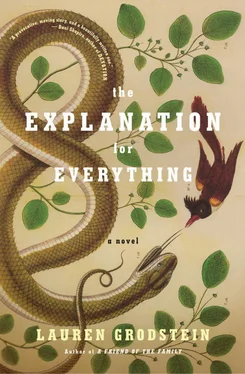“But what are you supposed to open your eyes to? That’s what I don’t understand. You’re supposed to open your eyes and instead of God find… nothing?”
“You’re supposed to find evolution, Lionel.”
Lionel sighed. “It doesn’t quite fill the void.”
“You don’t have to read that stuff if you don’t want to. Just because it’s out there doesn’t mean you have to read it.”
“But you assigned it.”
“Class is over, Lionel,” Andy said. “You did well, didn’t you?”
“I got an A for the second time in a row.”
Andy smiled. “I can’t believe you let the registrar give you credit for taking the same class twice.”
Lionel snickered, but it was a pale imitation of his old, dismissive snort.
“What I want to tell you is that I’ve been thinking about believing in God, Lionel,” Andy said. It was true. He had been thinking about believing in God, and in that consideration came the very seeds of belief. He had opened himself to the possibility, and now that he had, there was no turning back. God was a legitimate possibility, a possibility that answered questions of the heart the way that Darwin answered the questions of the mind, and accepting the possibility of God made Andy newly aware of his heart, and its capacity to heal. He felt his body unwind. “Belief has started to make more sense to me,” Andy said. “I think I can get where you’ve been coming from all these years.”
The admission made him feel pure and clean. He felt that if he could admit this to Lionel, he could admit it to Rosenblum, and to himself.
But Lionel did not look victorious. He just looked sad. “Congratulations,” he said to Andy. “You’re a lucky man.”
“Aren’t you surprised? You won this fight!”
“This wasn’t a fight, Professor.”
“Of course it was a fight! Why did you take my class if not to fight me, or fight Darwin? Didn’t you say that yourself?”
But Lionel just shook his head. Then he hitched his backpack over his shoulder and walked, shoulders hunched, out the door.
What would Rosenblum say to all this? To Lionel, he would say: Buck up, kid. The world is more magical than even Santa Claus, and you should be glad you figured it out. Then he’d turn to Andy and say: so I leave you alone and you turn into a schmuck.
And he’d tell him to get back to work.
The work. The mice. The misbehaving mice. The drunks who didn’t feel like drinking anymore. Andy looked through his notebooks.
If he had made some mistakes breeding his specimens, if he had adulterated the ethanol, if he had mismeasured their brain chemistries, if he had taken the wrong notes, if he had a research assistant to blame (could he blame the tech?) then his results would be easier to swallow. But he had never made these kinds of basic mistakes in the past, so why would he have started now?
Had he ordered the wrong kind of mice? Had the facility sent out a mislabeled supply?
Andy bent down to one of the cages, where his alcoholic mice slumbered. These tiny beasts were patented; according to the government, they were not animals but inventions. Which was the trouble: Andy could accept that animals might not behave the way they were supposed to (as a child, he was master of a series of mischievous dogs) but an invention, a laboratory-designed product—wasn’t that supposed to be foolproof?
Andy watched his small black mouse breathe in and out in its sleep. Its sleek tiny body took in air and expelled it, its whiskers fluttered, its soft ears quivered faintly in the still air. This animal had been designed in a laboratory, yes, but designed with DNA, the building block of life, the thing this mouse had in common with a whale and a tree and with Rachel and Belle. DNA, God’s tool kit, which man had tried to take charge of to design this small sleeping mouse.
Yet the mouse refused to behave the way the person who designed it expected it to behave.
Well, mistakes get made, said Rosenblum. Don’t get all mystical on me.
Andy watched the mouse breathe in and out. Sure, fine, mistakes get made—but what was the nature of the mistake? Did something go wrong in the design of this (twitching, breathing, marvelous) mouse, or was the problem the idea that we were the ones to design this animal in the first place?
November 30, 2003
Dear Appa, Umma, and Oppa,
And my dearest Charles, if you should read this some day, and forgive me,
I want you to know that first of all I am sorry for whatever sadness this note brings you, or discovering my mortal body. I hope you find some comfort knowing we will see each other soon in Heaven, in the Lord’s embrace. Until that time, please remember me as kindly as you can. By the time you find this I will be with God, and I will be happy. As I write this note, now, it seems to me that my work on this Earth has been completed and there is nothing left for my journey here. It is time for me to meet my Lord. I want to meet the Lord. I have so little to do on this Earth now and I can hear the Lord calling me home.
Before I knew the Lord, I thought that this Earth was all there was, and that we were supposed to “make the most of it.” So that’s what I did, I tried to make the most of it but all the things that should have brought me joy (a successful recital, a history prize, acceptance to Harvard) brought, instead, only brief flares of pride. Was the point of life really to bounce from one moment of vanity to the next? To try as hard as possible to succeed at trivialities? To be rewarded with money or the admiration of less successful people? Was that happiness? Even helping other people seemed mostly to point out how destitute and miserable other people’s lives were, and how limited anyone’s own capacity to really help. Like when my mother’s church group made its monthly visit to some Bed-Stuy food pantry, let’s not pretend they ever made any difference in the world, at least not in the big picture of it.
So then I thought: Okay, I know the problem. The problem is I don’t know the reason why . The scientific reason. I decided I would do my best to uncover the origins of life, so that maybe this stupid life of ours would make sense.
So ah, how horrible when my research into the origins of life brought me nothing but more frustration and sadness! How miserable when it seemed to me the point of it all was only more pointlessness! The more I pushed my research, the more it became clear that human beings were nothing but the improbable evolution of a misfiring virus. Our ancestors were bits of DNA electrified and sent out into the world. Our bodies, our very souls, were nothing but mechanisms to keep this pointless DNA alive! Henry Rosenblum, the only person in the world I ever trusted, before Charles, said to me that my research was magnificent. He said that uncovering the origins of human life was the equivalent of finding the God particle. In fact, it was the God particle! GOD WAS A VIRUS!
Only once, on our way to the Kent-Hughes ceremony in London, I tried to discuss my worries with Henry. I had never been to London before, and had packed the new raincoat my mother gave me for my birthday, and was wearing an old pearl ring she’d given me that had been my grandmother’s. I kept twisting the ring, since I was nervous; I’d never really liked to fly. I remember looking out at the clouds and thinking about all those kids I went to Sunday school with when my mother would force me to go, and how all those kids would look up at the clouds and believe that’s where God lived. And here I was, going to London to win money for erasing that belief.
I said, “Henry, do you think my work is destroying the meaning of life? Like when other people learn that all life started out as a virus, they’ll think life doesn’t have any purpose anymore?”
Читать дальше












